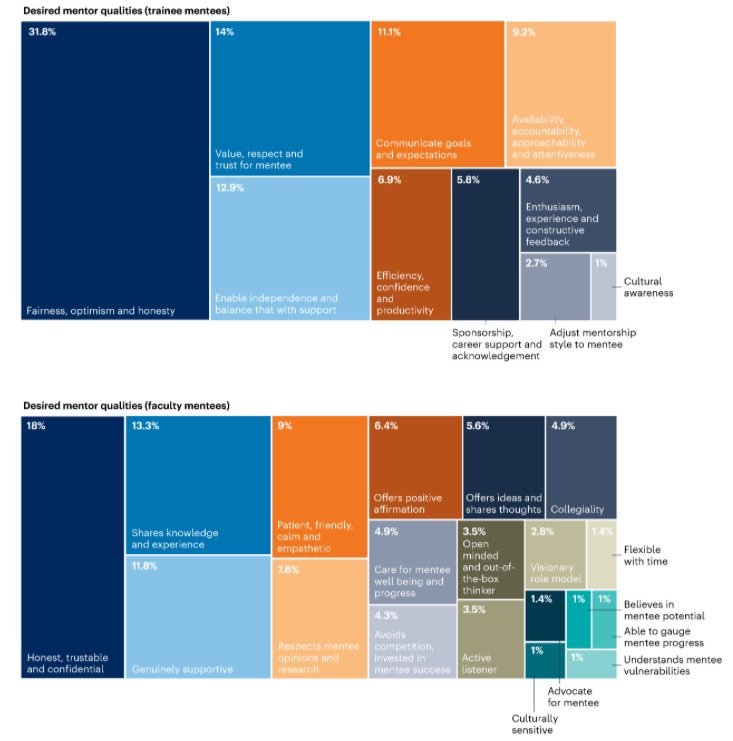Our collaborative work on mentorship
-

Improving Academic Mentorship Practices
Sarabipour S., Mackln P., and N.M. Niemi
Abstract: Mentorship from experienced peers critically improves individual career development and satisfaction in academia, but we have little information on how researchers are supported. We identify and recommend strategies for faculty members, departments, institutions and funders to ensure sustained excellence in academic mentorship.
-

The faculty-to-faculty mentorship experience: a survey on challenges and recommendations for improvements
Sarabipour S.*, Burgess S.J.*, Niemi N.M.*, Smith C.T., Bisson Filho A.W., Ibrahim A., and K. Clark
Amended abstract: In the interest of advocating for increased and enhanced faculty mentoring and mentoring programs, we surveyed faculty (i.e., group leaders) around the world to gather data on whether and how they receive mentoring from peers, senior researchers, informal mentoring programs, or formal mentoring programs at their institutions. We received responses from 457 early- and mid-career faculty and found that a substantial portion of respondents either reported having no mentor or a lack of a formal mentoring scheme. Qualitative responses on the quality of mentorship revealed that the most common complaints regarding mentorship included lack of mentor availability, unsatisfactory commitment to mentorship, and non-specific or non-actionable advice. Our findings further identified key mentorship elements desired by faculty mentees. Based on these suggestions, we identify a need for training for faculty mentors as well as strategies for individual mentors, departments, and institutions for funding and design of more intentional and supportive mentorship programs for early- and mid-career faculty.
-

Insights from a survey of mentorship experiences by graduate and postdoctoral researchers
Sarabipour S.*, Niemi N.M.*, Burgess S.J.*, Smith C.T., Bisson Filho A.W., Ibrahim A., and K. Clark
Amended abstract: Mentorship is vital for early career researchers in training positions, allowing them to navigate the challenges of work and life in research environments. However, the quality of mentorship received by trainees can vary by investigator and by institution. One challenge faced by those hoping to improve trainee mentorship is that the extent to which mentorship is offered to and experienced by research trainees is not well characterized. To address this knowledge gap, we conducted a survey to examine the quality of mentorship received by trainees in research environments, to identify characteristics of positive and negative mentorship, and to highlight best practices to improve trainee mentorship. We received 2,114 responses from researchers at graduate and postdoctoral career stages worldwide.
-

Improving mentoring in academia requires a ‘collective effort’
Careers Q&A - Science, May 12, 2023
First paragraph: “Sarvenaz Sarabipour is tired of academics understanding mentorship through anecdotes. The scientific community “needs a minimum set of standards for good mentorship,” says the Johns Hopkins University systems biologist, which can only be achieved by studying it systematically. “It’s important to acknowledge that some things are being done right, but there is a large variability in experiences and these need to be addressed.”
-

Prelights highlight - Trainee mentorship
“Be the helping hands for the future leaders in science: a guide to being a better mentor.”
Mentoring resources for trainees
-

Choosing the Right Advisor
DeWitt Scott, Inside Higher Ed
Amended introduction: Below are a few key points graduate students should consider when deciding on a graduate advisor. These suggestions are intended for the general graduate school experience and are not specific to any particular discipline.
-

Choosing a Thesis Lab
Skip Brass, Science
Amended introduction: Choosing a thesis lab and a mentor is probably not the toughest problem that you will ever face, but it is an important one, and you will want to get it right the first time. For many of you in combined-degree programs, this will be your first chance to develop a long-term relationship with a faculty member of your choice. The ideal thesis mentor should be successful as a scientist, experienced as a mentor, and willing to commit the time and resources needed for you to become successful yourself.
-

How to pick a graduate advisor
Ben Barres, Neuron
Abstract: In this NeuroView, I provide a guide for young scientists on how to select a graduate advisor or postdoctoral advisor. Good mentorship is not only pivotal for career success, but it is pivotal for driving innovation and for the health of our universities. Universities need to do much more to teach faculty how to mentor and to ensure mentoring quality. I propose an M-index to measure mentoring quality. I also call here for better studies of what great mentorship entails, better reward for great mentors, and more consideration of mentoring quality when awarding prizes and grants.
-

What is a Mentor?
Suzanne Koven, M.D., NEJM
“Perhaps, our group concluded, a mentor is someone who has more imagination about you than you have about yourself.”